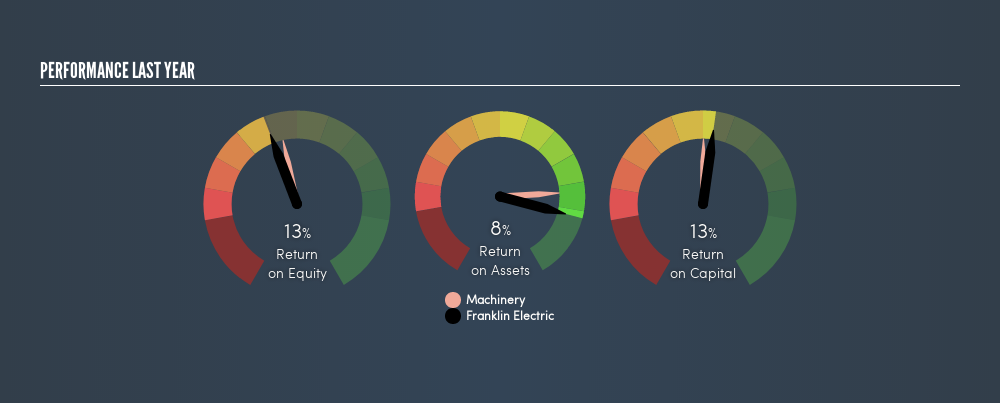- United States
- /
- Machinery
- /
- NasdaqGS:FELE
Do You Know About Franklin Electric Co., Inc.’s (NASDAQ:FELE) ROCE?

Today we are going to look at Franklin Electric Co., Inc. (NASDAQ:FELE) to see whether it might be an attractive investment prospect. To be precise, we'll consider its Return On Capital Employed (ROCE), as that will inform our view of the quality of the business.
First of all, we'll work out how to calculate ROCE. Second, we'll look at its ROCE compared to similar companies. Last but not least, we'll look at what impact its current liabilities have on its ROCE.
What is Return On Capital Employed (ROCE)?
ROCE is a measure of a company's yearly pre-tax profit (its return), relative to the capital employed in the business. In general, businesses with a higher ROCE are usually better quality. Overall, it is a valuable metric that has its flaws. Author Edwin Whiting says to be careful when comparing the ROCE of different businesses, since 'No two businesses are exactly alike.'
So, How Do We Calculate ROCE?
The formula for calculating the return on capital employed is:
Return on Capital Employed = Earnings Before Interest and Tax (EBIT) ÷ (Total Assets - Current Liabilities)
Or for Franklin Electric:
0.13 = US$126m ÷ (US$1.3b - US$301m) (Based on the trailing twelve months to June 2019.)
So, Franklin Electric has an ROCE of 13%.
View our latest analysis for Franklin Electric
Is Franklin Electric's ROCE Good?
When making comparisons between similar businesses, investors may find ROCE useful. It appears that Franklin Electric's ROCE is fairly close to the Machinery industry average of 12%. Separate from Franklin Electric's performance relative to its industry, its ROCE in absolute terms looks satisfactory, and it may be worth researching in more depth.

Remember that this metric is backwards looking - it shows what has happened in the past, and does not accurately predict the future. ROCE can be misleading for companies in cyclical industries, with returns looking impressive during the boom times, but very weak during the busts. ROCE is, after all, simply a snap shot of a single year. Since the future is so important for investors, you should check out our free report on analyst forecasts for Franklin Electric.
Franklin Electric's Current Liabilities And Their Impact On Its ROCE
Short term (or current) liabilities, are things like supplier invoices, overdrafts, or tax bills that need to be paid within 12 months. Due to the way the ROCE equation works, having large bills due in the near term can make it look as though a company has less capital employed, and thus a higher ROCE than usual. To check the impact of this, we calculate if a company has high current liabilities relative to its total assets.
Franklin Electric has total assets of US$1.3b and current liabilities of US$301m. As a result, its current liabilities are equal to approximately 24% of its total assets. Current liabilities are minimal, limiting the impact on ROCE.
Our Take On Franklin Electric's ROCE
This is good to see, and with a sound ROCE, Franklin Electric could be worth a closer look. Franklin Electric shapes up well under this analysis, but it is far from the only business delivering excellent numbers . You might also want to check this free collection of companies delivering excellent earnings growth.
If you are like me, then you will not want to miss this free list of growing companies that insiders are buying.
We aim to bring you long-term focused research analysis driven by fundamental data. Note that our analysis may not factor in the latest price-sensitive company announcements or qualitative material.
If you spot an error that warrants correction, please contact the editor at editorial-team@simplywallst.com. This article by Simply Wall St is general in nature. It does not constitute a recommendation to buy or sell any stock, and does not take account of your objectives, or your financial situation. Simply Wall St has no position in the stocks mentioned. Thank you for reading.
About NasdaqGS:FELE
Franklin Electric
Designs, manufactures, and distributes water and fuel pumping systems in the United States, Canada, Latin America, Europe, the Middle East, Africa, and the Asia Pacific.
Flawless balance sheet average dividend payer.
Similar Companies
Market Insights
Community Narratives





